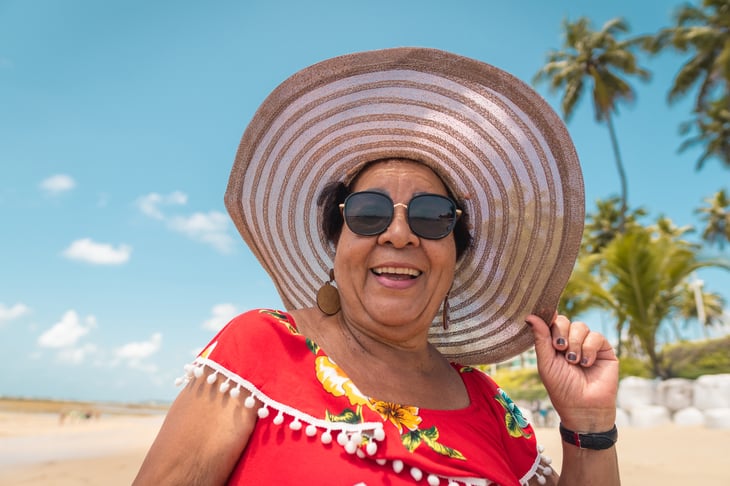July is Ultraviolet Safety Awareness Month. We love seeing our community members enjoying outdoor living spaces, but we want to remind you to protect your skin while enjoying the warm, sunny weather!
Do you know the risks associated with too much sun exposure? According to the Skin Cancer Foundation, skin cancer is the most common cancer in the United States and worldwide! In honor of UV Safety Awareness Month, learn more about the harmful effects of ultraviolet rays.
Skin Cancer Facts & Statistics
For general facts about skin cancer and tips for protecting your skin, check out this infographic on the Skin Cancer Foundation’s website.
- At least one in five Americans will develop skin cancer by the age of seventy.
- More than 9,500 people are diagnosed with skin cancer every day in the United States.
- In the United States, more people are diagnosed with skin cancer each year than all other cancers combined.
- Having five or more sunburns doubles your risk for melanoma. Melanoma is the most serious type of skin cancer.

UV Rays
The sun produces ultraviolet (UV) radiation which can lead to sunburn, skin aging, and skin cancer. Protection from UV rays is important all year, not just during the summer. UV rays can reach you on cloudy and cool days, and they reflect off surfaces like water, cement, sand, and snow. In the continental United States, UV rays are strongest from 10 a.m. to 4 p.m. daylight saving time (9 a.m. to 3 p.m. standard time). Most skin cancers are caused by too much exposure to ultraviolet (UV) rays. UV rays come from the sun, tanning beds, and sunlamps. UV rays can damage skin cells.
There are two types of rays that can damage the DNA in your skin cells and lead to cancer.
- UVB rays: These rays cause sunburn and play a key role in developing skin cancer. A sunscreen’s sun protection factor (SPF) number refers to the amount of UVB protection it provides. UVB rays have short wavelengths that reach the outer layer of your skin.
- UVA rays: These rays cause skin damage that leads to skin aging and wrinkles. When choosing sunscreen, look for the words “broad spectrum” on the product label. This means that the product has ingredients that can protect you from UVA and UVB rays. UVA rays have longer wavelengths that can penetrate the middle layer of your skin.
The UV Index forecasts the strength of UV rays each day. If the UV index is three or higher in your area, protect your skin from too much exposure to the sun. CDC recommends several ways to protect your skin when the UV index is three or higher.
What Can I Do to Reduce My Risk of Skin Cancer?
Practice Sun Safety & Minimize Your Risk!
There is good news! You can reduce your risk of skin cancer from appearing or reappearing. Making sun protection an everyday habit will help lower your skin cancer risk.

If you want to minimize the risk that comes with sun exposure, follow these tips:
- Cover Up: Clothing like wide brimmed hats, long-sleeved shirts, and sunglasses for eye protection, can partly shield your skin from the harmful effects of UV ray exposure. Consider a clothing brand that has an SPF rating.
- Shade: Try and stay in the shade when the sun’s glare is most intense at midday. It is important to remember that even on cloudy days the sun can still damage your skin.
- Sunscreen: Make sure that you choose the right sunscreen. The American Academy of Dermatology recommends choosing a sunscreen with SPF of 30 or higher.
- Amount of Sunscreen: Apply at least one ounce (a palmful) of sunscreen every two hours. If you are swimming, you should apply more often even if the sunscreen is waterproof.
- Avoid Tanning Beds: Lamps in tanning beds emit harmful UV rays that can cause skin cell damage.
Skin Checks
Although the American Cancer Society does not have guidelines for the early detection of skin cancer, many doctors recommend checking your own skin regularly, typically once a month, and consider having a yearly skin check by your dermatologist. Look for changes in existing moles or “freckles” or any new spots that may need examined by your dermatologist.
From all of us at Presbyterian Senior Living: Get outside! Enjoy the warm and sunny days, but don’t forget to take care of your skin before heading out! Afterall, your skin is the largest organ of the body!
